71CD - Laura Cole - Enough - CD plus download
TweetListen

Laura Cole - piano
I would like to say a very warm thank you to Jason, Chris, Julie, Martin, Sarah, Ruth, Kim, Seth, Alex, Robert, Corey and Nikki for contributing their beautiful pieces for me to arrange for this album. It was an honour and an inspiration to work on them.
'Crossing...' and 'Crossing.' are improvisations based on Walt Shaw's mixed media painting, 'Crossing', which appears as the front cover artwork on this album.
'Extinguish' is for my daughter, Martha. I asked Martha to suggest a title for the composition I would write for her; and she answered immediately with the word 'extinguish'. So I wrote the piece based on this word.
'As Warm As The Sun' is for Corey Mwamba.
'Enough...' and 'Enough.' are for the sculptor, Anne Truitt, and are based on her amazing journal, 'Daybook'; reading this book was the main impetus for embarking on a residency to prepare for this album, at Lyth Arts Centre, Wick, Scotland, in September 2017.
'Garden...' and 'Garden.' are improvisations based on Walt Shaw's mixed media painting, 'Garden', which appears as the back cover artwork on this album.
'For Sam' is for Sam the Steinway at Lyth Arts Centre, whom I worked with on my residency. Sam was a lovely companion; we shared some special moments!
Recorded at Steinway Recording Studios, Lincolnshire, November 19 and 20, 2017, by Spencer Cozens.
Produced, mixed and mastered by Corey Mwamba.
Follow Discus Music on Facebook
Read an in depth interview with Laura Cole by Nick Lea (Jazz Views) here.
Dereck Higgins talks in his blog about Enough - click this link to hear him.
I sat with these records for many months, attempting to pierce the veil, as it were. Not because British pianist Laura Cole’s music is obscure; on the contrary, her composition style is quite direct and open. Instead, I’ve been taking the time to pierce my personal veil, to pass through my initial surface impressions—extremely positive—to try and reach the core of Cole’s music. To call Cole merely thoughtful does a disservice to the purpose and message of her music: instrumental to her work is a mutually supportive community that strives and struggles collectively, raising each other up like sparks.
This year, Cole released two dramatically different albums. Enough is Cole’s first solo piano album, spanning two discs: “This Is Water,” a collection of compositions by thirteen different artists; and “As Warm As the Sun,” thirteen compositions and improvisations by Cole. The Two Fridas, a double album featuring Cole’s octet Metamorphic, with Kerry Andrews on vocals, Chris Williams on alto, John Martin on tenor and soprano, Ollie Dover on bass clarinet, Seth Bennett and Ruth Goller on bass, Johnny Hunter on drums, and Cole on vocals, piano, and Rhodes.
Despite the difference in sound between the two groups, the singularity of Cole’s musical voice clearly marks both. Metamorphic has been termed a folk/jazz group, though I think that designation may be a little misleading, depending on how you read those genres. It seems one only in the sense that John Stevens and Dave Holland’s 1960s-70s work was folkish. In fact, Stevens seems an important landmark in making one’s way through Cole’s music. Much of Metamorphic’s music brings to mind the Spontaneous Music Ensemble, especially the lengthy improvisations that emerge throughout this album. This is partly due to Hunter’s skittering, percussive style that’s reminiscent of Stevens’s sometimes loose, open playing. But also, there’s a clear through-line to draw from Stevens to Cole and Bennett’s roles in Julie Tippetts and Martin Archer’s ensemble, and that connection seems more pronounced on The Two Fridas than on past albums. Take “Charcole I” and “Charcole II,” two recordings of the same poem, on which Cole takes the lead vocal and the group performs radical, occasionally spiky improvisations.
In many ways, The Two Fridas calls to mind recent chamber-vocal albums by pianists Kaja Draksler and Cathlene Pineda. I had a chance to review Draksler’s octet album , but we did not write up Pineda’s Passing: A California Suite. All three artists create music that explores issues of motherhood and feminism, art and creativity, and the role of an individual within a community (there’s that inescapable word again!). And so when Cole interpolates “Little Wing” and “Lonely Woman” into “Little Woman, Lonely Wing,” the deftness of her composing places her nicely in line with Draksler and Pineda, two pianists who can be equally irreverent and moving.
What’s fascinating about Enough is the many ways Cole brings her community into a recording of solo piano. On the first album, “The Is Water” (its title referencing David Foster Wallace’s famous speech of the same name), Cole arranges and performs a set of compositions mostly from fellow players. To get a clear picture of the range, it’s worth sharing the full list of composers: Martin Archer, Seth Bennett, Miles Davis, Ruth Goller, Nikki Iles, Sarah Jewell, Kim Macari, Robert Mitchell, Corey Mwamba, Julie Tippetts, Chris Williams, Alex Wilson, and Jason Yarde. Cole’s arrangements, and the warm, close recording by Spencer Cozens, brings each piece to life, her playing at times reminiscent of Don Pullen or Myra Melford.
Tracks like “Outgoing Vessels” and the bracing “The Two Fridas”—or the lengthy “forgotten letters; Bereft; Tears: bright grey” and “Digging for Memories”—take listeners to some deep spaces, inspiring and conveying both contemplation and introspection. The very slight difference between external and internal reflection implied there says much about Cole’s music: there is a consistent inside/outside perspective. One gets the feeling that Cole is both working through something and guiding us along, progressing towards a fuller understanding of ourselves and the world. Again, I’m reminded of Stevens, of the gentleness of even the most angular and challenging of SME’s recordings. Cole, like Stevens, makes it seem easy to be this open, but as close listeners, we know nothing is that simple. – Lee Rice Epstein, Free Jazz Blog
A mood of calm introspection sits over this collection of pieces for solo piano. Yet, within that, Cole succeeds in exploring divergent avenues of expression. the first disc contains her arrangements of compositions by various associates from the UK jazz scene: Jason Yarde’s “Unisome (Unisin, Unison, Unisone, Unisum)!” is a fugue-like puzzle tackled with insouciant Monkish precision; Kim Macari’s “Default Settings” mingles harp-like sweeps of the piano strings with intensely intimate vocal mutterings: while Corey Mwamba’s “forgotten letters; Bereft; Tears: bright grey” is a solemn 15 minute suite of scattered stipples and enigmatic phrases. On the second disc, Cole presents her own compositions and improvisations, revealing a quietly emphatic sense of space: “The Crossing...” employs long pauses and isolated sonar-like notes, while “Extinguish” bathes in the warm glow of the sustain pedal, – DANIEL SPICER, THE WIRE
A very personal statement from an engaged musician! - VITAL WEEKLY
Laura Cole, in fact, has also brought out Enough on the label, a double album dedicated in one part to the interpretation of pieces written by various musicians, namely, among others, Jason Yarde (heard in the group 'Four Blokes' with Louis Moholo-Moholo), and Julie Tippetts/ Martin Archer, but also with a Miles Davis anthology- and on the second disc, a suite named after the composition entitled 'As Warm As The Sun', which is a series of short pieces referring to a painter (Walt Shaw, whose artwork appears on the CD sleeve, as well as on other albums on the label, where he also appears as a musician) or to a sculptor/tress (Anne Truitt).
The album veers between romanticism and improvisation, the spirits of Chris McGregor and Cecil Taylor hovering over it, the influence of Satie never far, and in amongst the rustling and murmuring of the inside work (played on the piano strings as well as the keys), Laura Cole presents a work which is inspired, as well as personal. - IMPROJAZZ
Of good music there is never enough. Yet the impressionistic, measured, expressive style of Laura Cole makes us take a few notes, well thought out and performed, of piano. The album is double. The first album features thirteen compositions by the British pianist; the second offers arrangements for piano only 10 tracks by different authors: ranging from Nardis by Miles Davis to Subside by Julie Tippets and Martin Archer, from Shapes and Sizes by Jason Yarde to Quantum by Robert Mitchell. Both records bring the listener into contact with the poetic soul of the pianist who, without unnecessary virtuosity, draws from the keyboard an expressive, meditative, delicate sound. A sort of conversation with itself, even when it passes through dialogue with other musicians. In my opinion, the only slightly stinted note is not really a note, but a poem, Sorrow, a beautiful blue butterfly , whose presence in this context would seem superfluous. – 4 stars - Alessandro Bertinetto, KATHODIK
In November 2018 I reviewed the double album “The Two Fridas”, the third album release by the group Metamorphic, led by Leeds based pianist and composer Laura Cole. My review of “The Two Fridas” can be read here; http://www.thejazzmann.com/reviews/review/the-two-fridas/
Reviews of the two previous Metamorphic releases “The Rock Between” (2011) and “Coalescence” (2013) can also be read elsewhere on The Jazzmann.
Cole regards “The Two Fridas” and this second double set, the solo piano work, “Enough” as companion pieces. She has written;
“The context for both albums was an intensely difficult time in my personal life. Both albums are an attempt to express intimate emotions and thoughts through the creative and recording process; they aim to tell a story”.
Released a few months after “The Two Fridas” Cole’s solo piano release was recorded over the course of two days in November 2017 at the Steinway Recording Centre in Lincolnshire.
The work is divided into two clearly delineated halves. Disc One, subtitled “This is Water” mostly comprises of pieces by other UK based contemporary jazz composers commissioned by, and arranged by, Cole.
Its companion, subtitled “As Warm As The Sun” consists of compositions and improvisations by Cole herself. The album was produced, mixed and mastered by vibraphonist Corey Mwamba, who also contributes a composition to the first disc.
“This is Water” commences with a piece by saxophonist Jason Yarde titled “Unisome (Unisin, Unison, Unisone, Unisum)!”. Percussive and rhythmically playful it makes for an intriguing and enjoyable opener.
Another saxophonist, Chris Williams, wrote “Shapes and Sizes”, a piece initially performed by the powerful ‘punk jazz’ quintet Led Bib, of which the composer is a member – he’s also part of Cole’s own Metamorphic group. It’s nothing less than astonishing to hear Cole transform this composition into a lyrical and sensitive solo piano performance, albeit with the occasional pocket of turbulence along the way.
“Subside” was co-written by vocalist Julie Tippetts and multi-instrumentalist and Discus label founder Martin Archer. It’s another lyrical performance, sombre even, at times, with Cole making effective use of space, a characteristic that distinguishes the album as a whole.
“Nardis / Solar / I like to sound like a rainforest / I thank you god” effectively combines the writing of Miles Davis, Ruth Goller and Sarah Jewell into a cohesive, brilliantly recognised and executed whole.
Trumpeter Kim Macari’s “Default Settings” is more akin to a free jazz performance with Cole working ‘under the lid’ and adding Tippetts inspired vocal tics and whisperings.
“Alsten”, written by Cole’s Metamorphic colleague, bassist Seth Bennett, is more straightforward with its pastoral mood and gently rippling arpeggios. It’s undeniably beautiful.
Fellow pianist Alex Wilson’s “Rendezvous” combines a similar lyrical beauty with more forceful, rhythmic and percussive interludes. This segues into “Quantum”, a rather more sombre, and sometimes knotty, meditation written by another pianist, Robert Mitchell, himself an acknowledged master of the solo piano format.
Corey Mwamba’s contribution as a composer is the fifteen minute suite “forgotten letters; Bereft; Tears; bright grey”. This commences in starkly minimal fashion, but with each phrase carrying a whole weight of meaning. The sections that I presume signify “Bereft” and “Tears” sound suitably dolorous with their minor chords and low end rumblings, but along the way there are also glimpses of lyricism and beauty.
The first disc concludes with “Meditations / Fade (Over)”, a collaborative work by Yarde and pianist Nikki Iles which continues the mood of melancholic, but beautiful, introspection.
With regard to “As Warm As The Sun” Cole’s liner notes provide illuminating insights into the inspirations behind some of the individual pieces.
The two opening pieces “Crossing…” and “Crossing” are both improvisational responses to Walt Shaw’s mixed media artwork “Crossing” which appears on the album’s front cover (pictured).
“Crossing…” develops from the starkest of openings, that sense of space that distinguished the first disc now made even more apparent in the heavily nuanced single note phrases that seem to hang in the air. Even when Cole becomes slightly more expansive there’s still a palpable sense of an unnamed vastness and a threatening mood of unease that continues into the companion piece “Crossing”.
“Extinguish” was written for Cole’s daughter Martha, who suggested the word on which the composition was to be based. Although less sparse than the two “Crossing” pieces there’s still a brooding spaciousness about the music with Cole making effective use of the sustain pedal.
“907 / Room With A View” is a reflectively lyrical solo piano piece while the following “Sorrow, and a beautiful blue butterfly” finds Cole reading her own poem with no piano in earshot. The poem possesses its own beauty, but it does interrupt the flow of the album – I accept that others may see it as punctuation. In any event it’s unfortunate that Cole’s words are not reproduced on the album packaging, which would help to enhance the listening experience, or, alternatively, make the work public without interrupting the flow of the music.
“As Warm As The Sun” is dedicated to producer Corey Mwamba and combines warmth and lyricism with spikier episodes that perhaps allude to Mwamba’s avant garde and free jazz leanings.
The companion pieces “Enough…” and “Enough” were written for the sculptor Anne Truitt whose journal “Daybook” encouraged Cole to undertake an inspiring artistic retreat to the Lyth Arts Centre in Wick, Scotland. Cole used her Scottish residency as preparation for the recording of this album, and it was clearly time well spent. Musically the economy and spaciousness of the playing on these pieces is perhaps a reflection of the lonely beauty of Cole’s Caithness retreat. But once again there are angrier, more dramatic moments, perhaps intended to reflect the harshness and changeability of the Scottish climate and landscape.
At a little under nine minutes in duration “The Sphinx” is the lengthiest performance on this second disc. It unfolds slowly and organically, Cole is a musician who never sounds rushed or hurried and who always makes effective use of the spaces between the notes. Her playing is never about mere technique, she is more concerned with making an emotional effect, or in her own words, “telling a story”.
These qualities are also readily apparent in the following “Outgoing Vessels”, a captivating pianistic voyage that covers an impressive stylistic, emotional and dynamic range over the course of its six and a quarter minutes.
“Garden…” and “Garden” are improvised responses to another Walt Shaw mixed media painting, “Garden”, which adorns the album’s back cover. If the holy grail of jazz is for the composed and the improvised to be indistinguishable then Cole finds it here with these performances, somehow managing to sound both structured and spontaneous.
The album concludes with “For Sam”, a piece dedicated to the Steinway at Lyth Arts Centre, which Cole christened ‘Sam’. “We shared some special moments!” she exclaims. The music is suitably warm hearted with a tender, flowing melody and a wilful sense of simplicity throughout. There’s a sense of peace and reconciliation about the music, making this piece the perfect album closer.
Like its counterpart “The Two Fridas” “Enough” is clearly another labour of love for Cole and again is a very personal recording. Following her preparations at Lyth Cole rises to the challenge of the solo piano recording with great aplomb. Her playing is superb throughout, exploring the sonic capabilities of the instrument but without ever becoming ‘showy’ or ‘flashy’. Her carefully sustained moods serve the music well, both the written and the improvised, and much of the music is very beautiful, if a little sombre at times. Mwamba is to be congratulated on the superb recorded sound which captures the nuances of Cole’s playing with warmth and clarity.
Some listeners may regard a double album of solo piano as something of an indulgence, and arguably the spoken word track is, but there’s no musical flab on this absorbing and compelling recording with no track being allowed to outstay its welcome. Cole plays with skill and economy and her work compares well with more famous exponents of the format (Jarrett, Corea etc.).
Fans of contemporary solo jazz piano would do well to check out this tightly focussed offering from Laura Cole. - Ian Mann, JAZZMAN
A lot of jazz albums come with similar appreciations and explanations. Whether or not a listener can relate them to the music is arguable. (That the music is strictly jazz may be up for debate too.) They’re nice to know but are best read after the music has been heard.
Cole makes a gentle, mischievous start by subverting Yarde’s “Unisome” with displacements of tempo and rhythm, goading its essential simplicity into something more complex but not necessarily transformative. Chris Williams’s tune in “Shapes and Sizes” is enriched harmonically and involves a short but forceful battle between right and left hand.
Cole never pretends that her function is complete metamorphosis of what she’s been given to work on. The often persistent motifs or ostinati have all manner of things going on around them, such as the impressionistic episode in “Quantum” (Robert Mitchell), and the familiar exploration in “Default Settings” (Macari) of what sounds the piano can produce without the pianist actually touching the keys. But they somehow retain their integrity. These are, after all, treatments.
Perhaps only Iles’s “Meditations”, segueing into Yarde’s “Fade (Over)”, which ends This Is Water, is too original for any adaptation or readjustment to obscure it. Miles Davis’s “Nardis”, however, which begins a quadriptych with contributions from Ruth Goller and Sarah Jewell, is not held in any preferential awe. Mwamba’s quartet of themes makes for a 15-minute survey, the longest on the first CD, with Cole relishing the chance to adopt some louring moods.
Mwamba is the dedicatee of “As Warm as the Sun”, a Cole work from the eponymous second CD, described as “compositions and improvisations”. While improvisation, or sounds made to sound spontaneous, is a requisite of jazz, it is now a feature of contemporary “classical” music as well. So those struggling to call this album jazz as they know it will find no help in that quarter. But whereas the first CD at times enjoins elements peculiar to jazz, if often requiring a listener’s leap of faith, the second seems pretty much to distance itself from them. The structures are fugitive and appear to be there simply to provide platforms for tentative exploration. Often playful, sometimes as concerned with silence as with sound, but always resistant to much elaborate progress, these charts reflect minimalist pianism and discretion.
The history of jazz is a kaleidoscope in time; its patterns are different, even controversial, but its musicians have rarely been backward in coming forward. Cole’s absorption in what the piano is doing, even when it’s doing nothing at all, seems far from all that, though in its own terms, whatever they are, it merits attention.
– Nigel Jarrett, JAZZ JOURNAL
Laura Cole is a long-standing player with Martin Archer groups, including Deep Tide Quartet and Engine Room Favourites, and the recent Metamorphic record was a showcase for her songs, poetry, and piano work. She’s here now with Enough (DISCUS MUSIC DISCUS 71CD), a double disc set of her solo work. On This Is Water, Cole plays solo piano on ten pieces composed by friends and collaborators, including fellow Engine Room players and Archer himself; listeners who enjoy melody and chord progressions will enjoy Cole’s warm playing here. The works are not especially “out”, and wouldn’t have felt out of place on any given Prestige album from jazz’s “cool” period; only Kim Macari’s ‘Default Settings’, with its determinedly minimal stance, could perhaps be considered experimental.
I’m finding more interest in the second disc, As Warm As The Sun, a set of 13 compositions and improvisations (and some poetry); to begin with the music is less like conventional jazz, and more like post-Webern modernism; the rich chords and melodic inventions are downplayed in favour of a more uncertain, ambiguous approach; strange melodies and skeletal notes hanging in the spaces between, and the best pieces feel like an unanswered question. One tune is even called ‘The Sphinx’, suggestive of a riddle. With this second disc, Cole may have come closer to achieving her stated aim with Enough, which was intended as a “highly personal” record of “intimate emotional journeys”. This seems to have been in response to a professional / personal crisis of the artist herself, to do with the tension between public performance and the privacy of the creative process.– Ed Pinsent, SOUND PROJECTOR
I should start this review with a disclaimer, that Laura Cole is an old friend and colleague of mine, and I know her work intimately. I've played with her in her band and many others, and have always been a massive fan of her very particular virtuosity. An especially memorable gig was with her and the producer of this album, Corey Mwamba, at which I was frankly embarrassed at my inability to operate at their sky-high level of melodic and harmonic understanding.
The harmonic integrity of Laura's playing is one of the stand out features of this release. On the second disc, all her own compositions/improvisations, she follows her music's own direction, allowing it to dictate each next step as logically and intuitively as J.S. Bach or Monk, while simultaneously suggesting many other possible directions; routes hinted at and somehow fully fleshed out, despite never being followed. There is room for the listener's own imagination in this music – it offers so many options, so discretely, that it never tells you what to hear, rather allowing you to hear all the directions the composer hears. Essentially the only difference between being composer of and listener to this music is that, as a listener, one doesn't get to make the final decision.
The other striking aspect of this release is its understatement. If music can be under-composed, can it also be under-improvised? If so, and if it's possible to use that term as a positive, then I would describe this music thus. Like John Taylor, Cole plays the minimum possible to convey her idea, and keep it alive. I think it's why her work is often underappreciated. She rarely flies around the keyboard, rarely uses conventional jazz language, and more usually leaves a note unplayed if it is not crucial to the music. This aspect of her playing really stands out in a solo context. She gives us the idea, often goes on to frame it perfectly yet obliquely, and then moves on. This is not to say that ideas or lines are not developed over time, rather that they are allowed to evolve organically, never forced into places they do not wish to be in.
A final aspect to note is that this is a double CD album. The first disc features recordings of tunes by Cole's friends and peers (including myself), and the difference in music between the two discs is quite striking. Simply put, her approach to compositions by others seems to be to serve the song as much as possible – she puts her stamp on each one, often reharmonising or recontextualising music to show her view of each piece – but always allows its original character to breathe. In the same way that looking at a building or sculpture from a different angle can allow us to understand new aspects of it, Cole's reintepretations show us these pieces in a new light. She often starts at a point quite far away from the original music, before sneaking us into the main body of the piece almost without us noticing. Nardis is introduced with the B7 Cmajor7 progression from its third and fourth bars, but played out of context. The original melody floats around what is actually being played, while never being stated. The middle eight then emerges, but played with a Jarrett-like gospel quality, becoming a disconcertingly conventionally beautiful passage among much more oblique music. The whole piece is somehow represented more fully through never being explicitly played.
Always beautiful, often troubling, and deeply moving, this record is a masterpiece of understatement and integrity. Cole ought to be celebrated as one of the greats of British improvised music after this release. Always fiercely true to herself and her conception, this album nevertheless generously welcomes anyone with open ears and a desire to hear. All you have to do is listen! - SETH BENNETT - PERSONAL BLOG
Zcela jinak je koncipováno sólové dvojalbum Enough pianistky Laury Cole, nahrané ve Steinway Recording v Lincolnshire 19. a 20. listopadu 2017. První CD, pojmenované This is Water, je vlastně kolekce kompozic blízkých skladatelů v aranžmá samotné protagonistky. Jsou to Jason Yarde, Chris Williams, Julie Tippetts a Martin Archer (!), Miles Davis, Ruth Goller a Sarah Jewell, Kim Macari, Seth Bennett, Alex Wilson, Robert Mitchell, Corey Mwamba, Nikki Iles a Jason Yarde, ale pokoušet se ozvláštňovat desatero jejich předloh by bylo poněkud na vodě, poněvadž aranžérka jim natolik vtiskla pečeť své osobnosti, že bych se musel sáhodlouze rozepisovat o proporčnosti předlohy a jejího konečného ztvárnění. Každopádně posloupně vnímám, jak je tu Cole hledačsky rozkryvná a zabíravě náchvatná i zase váhavě jemnocitná a rozvažovačně přemítavá, jako by se odhodlávala stále dominantněji k nabídnutému řešení, popřemílala je i zatěkávavě oddalovala. Její sondování je nahlíživě přístojné i pomnožovaně zarecyklované, ale i protichle odvažovačné, s gruntovní rozmáchlostí i rozporností, navlékavostně zašátrávanou. Ale může vyvěrat také ze spodního proudu zapauzovávané namátkovosti, vyharfovávané zakuráženosti, násměrńující ke smírně pozamlklému doličování, vedoucímu vzápětí k nesmělé opovážlivosti zopakovávaného rozprostorování a zhábitovanému dozakrytí. Jenomže pak se pianistka zasměluje jako na vážkách, posbírává s nesmělou zátažností zhoroucňované vyjemňování, nadlehčovaně zatoužené, a přitom zakleslé odhodlávání, aby si následně vytroufávala zamyšlenou, leč nenamyšlenou rozkryvnost, vymětavě obtočivou až k dodernosti. Může však i polosměle vyjukávat, zastíravě záplatovat či zápláštňovat a zastřenostně zadychťovat, neboť v daném případě je téma vyličováno s až hraničním poklidem, do něhož se zasouvají útržky vzrušení. Když aranžérka naruší smírnou atmosféru (ve více než patnáctiminutové extravaganci), progustýrovává si bez chvatu každý tón s jednosměrnou zatáhlovaností. Ten výběr prostě odpovídá nátuře Laury Cole, nevystřeluje do stran ani do výšek, je vodovážně prokolísán až do znesmělované zátišnosti, je to nastraživá střídmost, která má své vnitřní napětí i rozpětí.
Druhý disk s názvem Warm as the Sun obsahuje třináct vlastních kompozic / improvizací, z nichž některé (Crossing, Enough nebo Garden) se do tématu trefují zdvojeně. Bazírují jak na vlastních prožitcích (například s dcerou), tak na inspirativních výtvarných předlohách, mohou být (opět postupně) osmělovaně propátrávané a šátravé se zavýbojkovanou titěrností i jemně pohrávavé s povlovným hledačstvím každého tónu, distinguovaně rozpustilé i vyoktrojované do urputnosti. Každopádně je v nich více nápovědi nežli systematického rozvíjení, , bývají záminkově rozbíhavé a zkoumavě průzkumné bez dořešení, postupkově zasukovávané i obzíravě evokované. Mezi privátností a veřejnou sférou osciluje celé album. K tomu přispívá i svěřivě protajemňovaný hlas, jehož nevzrušená, pozastřená monotónnost není na závadu, což ve vyzývavěji nabíhavém pokračování sice zakolísá až do skotačivosti, jenže nerozverné. Když klavíristka posléze s cimprlichovou jakobybojácností vymne tón po tónu, jako by je sochařila nebo načrtávala suchou jehlou, zvrtne se ve stejnojmenném pendantu do vydestilovávané závratnosti, bezezbytkově extrahovaná náhalnost je opět jednolitá a klouže do ponorné jímavosti. Pak už je načase propátrávat tajemnost sfingy, šálivě zezáhadněné, obmanutě prozračivé, nikoli však průzračné, čeřené jakoby zpovzdálí, nekoketně, naopak důtklivě rozbíhavé. Čemuž oponuje následující prosívavá zabíhavost, vehementně zapevněná, až jistojistá. Dění nabíhá do zátočinové bloudivosti, obrůstané jako živým plotem, ale jde spíše o jednolitý kruh o mnoha ploškách, lomivých, leč v základě neproměnných. A tak zakončování proběhne ve znepokojivé vrtošivosti, dovytrácené nebo doztrácené v doskonavosti. Ale vlastně ta rozkouskovávaná atmosféra má neustále společného jmenovatele v záskočném rozvíjení a zavíjení. A není divu, že už dnes Cole nemá v tomto ohledu Dost, že plánuje na únor 1919 vystoupení v londýnském Vortexu, tentokráte však nikoli sólové, nýbrž v duetech se skladateli a hudebníky, s nimiž jsme se potkali na první desce tohoto kompletu. – ZDENEK SLABY, HISVOICE





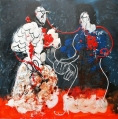 65CD - Metamorphic - The Two Fridas - CD plus download
65CD - Metamorphic - The Two Fridas - CD plus download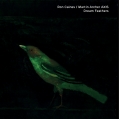 88CD - Ron Caines / Martin Archer AXIS - Dream Feathers - CD plus download
88CD - Ron Caines / Martin Archer AXIS - Dream Feathers - CD plus download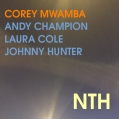 86CD - Corey Mwamba - NTH - CD plus download
86CD - Corey Mwamba - NTH - CD plus download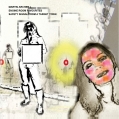 66CD - Martin Archer + Engine Room Favourites - Safety Signal From A Target Town - CD plus download
66CD - Martin Archer + Engine Room Favourites - Safety Signal From A Target Town - CD plus download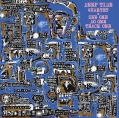 64CD - Deep Tide Quartet - See One, Do One, Teach One - CD plus download
64CD - Deep Tide Quartet - See One, Do One, Teach One - CD plus download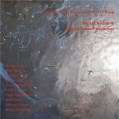 50CD - Martin Archer & Engine Room Favourites - Bad Tidings From Slackwater Drag - CD plus download
50CD - Martin Archer & Engine Room Favourites - Bad Tidings From Slackwater Drag - CD plus download 43CD - Martin Archer - Blue Meat, Black Diesel & Engine Room Favourites - CD plus download
43CD - Martin Archer - Blue Meat, Black Diesel & Engine Room Favourites - CD plus download